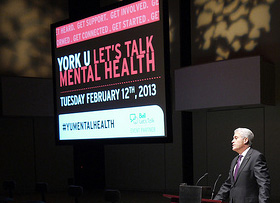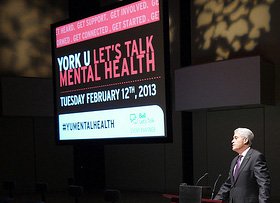
Mental health initiatives to be launched this Fall for faculty and students. The new program will include online tutorials and increased communications to help inform the York community of the resources available to them.
Let’s talk York.
In an effort to increase mental health awareness on campus, York unveiled a five-year mental health strategy on May 14, 2013.
Suzanne Killick, a co-lead of the strategy and director of learning and organizational development, says the first 18 months of the plan will focus on creating mental health awareness through “Mental Health EDU,” a 20-minute online program that helps faculty learn the signs of students in distress.
Also within the first 18 months, efforts will be made to enhance communication about resources that are available to students on campus.
Frank Clarke, director of communications and planning for the faculty of health, says the main goal is to increase talk around mental health, remove stigmatization surrounding the topic, and debunk common myths.
Communication efforts will include events similar to the “Let’s Talk Mental Health” day held this past February, as well as peer mentoring and community support programs.
Coordinator of health education and promotion Haran Vijayanathan says the strategy will also include information sessions and professional development sessions to build the confidence levels of staff and faculty in addressing mental health issues.
“Sometimes we find that everyone is aware of these signs and symptoms of mental health, but [the issues are] more in their comfort level of approaching students about them,” says Vijayanathan.
The new strategy is about recognizing students may be struggling and providing them with access to resources on and off campus whether it’s therapy, physical activity, counseling, or crisis lines.
Lesley Beagrie, associate dean of professional and global programs, and co-lead of the new strategy says she felt that there was a need for York to address mental health issues more comprehensively.
She notes stress levels among some students were increasing.
“As an associate dean, I did see an increase in student academic petitions, and a lot of students were citing stress or other serious mental health concerns as a reason for why they were not as successful,” Beagrie says.
The strategy was created after research was conducted on campus on people’s concerns about mental health. The York University Psychology Clinic and the Centre for Disability Services also provided input during the development of the strategy.
Beagrie says external research from other universities on mental health issues also helped in creating the strategy.
Zaynah Aleemullah, a fourth-year biology student, hopes the new strategy will make using mental health services less intimidating.
“Currently at CDS, if you want some attention, you need to fill in a form, book an appointment with a secretary, see an intake counselor, and then finally see a counselor who will help you,” she says. “It takes a lot of courage to open up to a counselor, so I think they should work on making the procedure less impersonal.”
That said, she says it’s encouraging to see York addressing mental health issues that affect its student population.
Other initiatives under the strategy are still being developed by the Mental Health Steering Group, which is made up of faculty, staff, and students.
The group is responsible for implementing the strategy over the course of five years and hopes to launch the “Mental Health EDU” program by September 2013 as part of student and faculty orientations.
Rameeza Ahmed
Assistant News Editor




